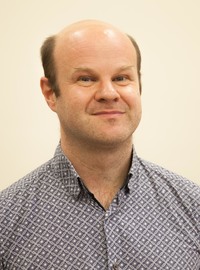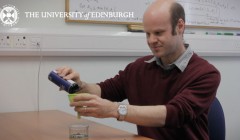Richard Blythe

Professor R A Blythe
- Position
- Professor
- Category
- Academic staff
- Location
-
James Clerk Maxwell Building (JCMB)
Room 2505
- Email: R.A.Blythe [at] ed.ac.uk
- Tel: +44 (0)131 650 5105
- Personal home page
- Edinburgh Research Explorer profile
Richard is a member of the following School research institute and research areas:
Research institute
Research areas
Research interests
Prof Blythe's research concerns modelling and understanding complex far-from-equilibrium systems. These systems abound at all scales, from cells through driven materials to evolving ecosystems and societies. As yet we lack a complete theory for predicting the emergent macroscopic consequences of the interactions between the constituents of these systems. Until this is achieved, such long-term goals as controlling materials driven by industrial processes, or forecasting the future behaviour of an ecosystem or a society will remain out of reach. As such, emergence and physics far from equilibrium has been recognised as a Physical Science Grand Challenge for the 21st Century.
Prof Blythe's research directly addresses this challenge in two ways. First, he investigates far-from-equilibrium systems at a fundamental level by means of mathematical analyses of models to establish how basic properties of a system (e.g., symmetries, conservation laws and spatial heterogeneity) govern their macroscopic behaviour. Second, there are many opportunities to apply quantitative techniques from the physical sciences to test theories in other disciplines in new ways. A major part of his recent research has involved applications of modelling in the context of human linguistic behaviour at various levels of description. The nature of evolving linguistic systems – whereby patterns of behaviour at the level of societies emerge from a combination of human cognition and social interactions – makes them a natural fit to the paradigmatic approach of statistical physics that attempts to explain patterns in macroscopic systems with many constituents from knowledge of the interactions between component parts.
Prof Blythe was appointed to the University as a Lecturer in 2007 and promoted to Reader in 2014 and to a Personal Chair in Complex Systems in 2019. His professional activities have included being a Divisional Associate Editor of Physical Review Letters (2011-17) and is currently an Academic Editor of PLOS ONE.
Prof Blythe has made many contributions to teaching and curriculum development in the School of Physics and Astronomy in the University of Edinburgh. In 2018, he was awarded a Senior Fellowship of the Higher Education Academy in recognition of these contributions.
At present, Prof Blythe is responsible for the following undergraduate course at the University of Edinburgh:
- Mathematics for Physics 1 - Introductory mathematics course for students new to the university, covering core skills in algebra and calculus.
Previously, he has taught
- Statistical Mechanics - Junior Honours course introducing physics students to the statistical approach to modelling many-body systems microscopically.
- Linear Algebra and Several Variable Calculus - Pre-Honours introductory mathematics for physics, covering vectors, matrices, partial differentiation and multiple integration in a physics context.
- MPhys Project - Final year research project for students on the MPhys integrated masters programmes in Physics, Astrophysics, Theoretical, Mathematical and Computational Physics.
- Research Methods in Physics - Juniour Honours introduction to cutting-edge research in physics and a chance to develop research skills such as searching and understanding the scientific literature, writing scientifically, critiquing other scientists' work and giving presentations.
- Nonequilibrium Statistical Mechanics - Biennial postgraduate course on the application of relevant statistical physics methods to a variety of nonequilibrium systems. This course is taught as part of the SUPA Graduate School.
- Modelling and Visualisation in Physics - Senior Honours course in computational physics, covering key modelling and simulation methods (Monte Carlo, molecular dynamics, iterative methods for solving partial differential equations) and data visualisation and analysis techniques.
Prof Blythe has also taught at a number of graduate schools, nationally and internationally. These include:
- Statistical Mechanics course at UK National "Physics by the Lake" / "Physics by the Sea" Theory of Condensed Matter summer school (2008-19)
- Stochastic models of evolutionary dynamics at "Steps in Evolution" summer school, Jacobs University, Germany (2009).
- Modelling Language Change at Linguistics Society of America Summer Institute, University of Colorado, Boulder (2011).
- Equilibrium and Nonequilibrium Particle Number Fluctuations as part of MSc Masterclass in Modelling Complex Systems, Kings College London (2013).
Richard currently offers the following PhD project opportunities:
Richard has featured in the following recent School news stories:
- Funding success for training and research into biological systems
- Physicists and linguists team up to uncover the forces that shape grammar
- Research and collaboration boosted by Royal Society of Edinburgh funding
- A diffusing barrier creates a new universality class for interfacial growth
- Statistical physics reveals the power of simple word-learning strategies

Jamming and dialects
In this video Richard explains why the apparently unrelated questions of why peppercorns jam in the mouth of a funnel and how dialects change can be answered by statistical physicists.Recent publications
- , PLOS Complex Systems, 2, 11, p. 1-23
- , Journal of Statistical Mechanics: Theory and Experiment, 2025, 8, p. 1-29
- , Physical Review E, 110, 5, p. 1-11
- , PLoS Computational Biology, 20, 4, p. 1-27
- , Corpus Linguistics and Linguistic Theory, p. 1-43

